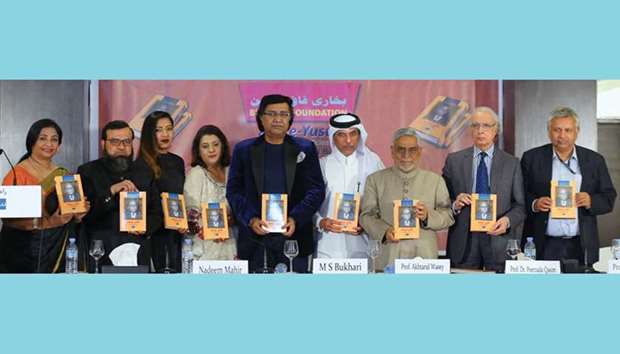The book contains research articles on different topics, ranging from archaeology to religion. The book is compiled by Nadeem Mahir, a Qatar-based Urdu poet and writer. It was published in Doha in July this year.
The ceremony, held at Radisson Blu Hotel, was attended by a selective gathering of notable personalities. Professor Pirzada Qasim, Vice Chancellor of Ziauddin University Karachi, Pakistan and a known poet, was the chief guest at the event. Professor Akhtarul Wasey, President of Maulana Azad University, Jodhpur, India, and a noted Islamic scholar, and Professor Shafey Kidwai, Head of Mass Communications at Aligarh Muslim University India, were the guests of honour. Faisal al-Suweidi, Assistant Director at Ministry of Culture and Sports, officially represented the ministry as a special guest. The event was compered by Usha Ravishankar.
In his welcome speech, MS Bukhari said, “I am too emotional to talk about the book and my father. To highlight his research work is not the only reason for putting his works into the form of a book. I have actually done this for myself. I have brought forth the book just to show my respect to him. My father died in 1996 and I left Bhopal a long time ago to earn livelihood. I couldn’t get much time to know my father as a scholar or writer. I did not know about his research works until few years ago when I got a chance to enter his small library at our old house in India. When I got to know about his works, I felt sorry for myself for not being aware of my father’s scholarly works. This is the first edition in Urdu. I thank my family for all their support and Nadeem Mahir, who carried out the research and selected the best articles for this book. He went to Bhopal and spent a lot of time to do the research. Nadeem has done all this for free and only for the sake of the research.”
He added, “My father had post graduate degrees in History and Persian. After his education, he joined Indian Administrative Services. My father was at home in Urdu, Hindi, English, Persian, Arabic, French and German languages. He had carried out research works and wrote about different issues ranging from archaeology, history, social issues and Islam. He was also adept at museology. While working with the archaeology department of India, he restructured and re-established many museums in France, US, Canada, Australia, Spain, Yemen, and Algeria during 1950s and 60s.”
Speaking about the book, Nadeem Mahir said, “Yusuf Kamal had a versatile personality. Through this book, I have only brought to light his invaluable works. The book was initially launched in India few months ago. We have received a lot of appreciation from different libraries in India for the book. Yusuf Kamal has done a lot of work in archaeology, history, religion and other social issues.”
He added, “The essays included in the book are about different topics including Islamic architecture in India, architecture in the era of Amir Khusrow, architecture during times of Sikander Begum in Bhopal, history of world manuscripts, advent of Urdu script, teachings of Prophet Muhammad (PBUH), Qur’an, inter-faith harmony, rights of neighbours, status of women in Islam and contemporary society, and the Muslim and India history.”
Professor Akhtarul Wasey said, “We are living in the times of verbal knowledge. In the name of specialisation, we go in one direction only during our life. It is necessary to be a generalist to become a specialist. In our previous generations, there were people with versatile approaches and skills. Yusuf Kamal was also a versatile person and scholar. This book is an index of his scholastic accomplishments. One can disagree with the viewpoints of Yusuf Kamal but one cannot undermine the depth of his knowledge. I will recommend that the universities in India need to include the research works of Yusuf Kamal in their curriculums.”
Professor Qasim said, “A book is a source of conveying one’s knowledge and experience to other people. The book culture should be appreciated. My love and respect for MS Bukhari has proved to be a responsible son. It is always the duty of a son to share the accomplishments of his father with coming generations.”

